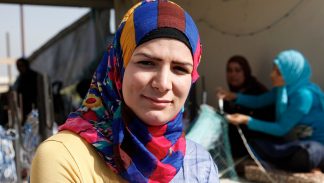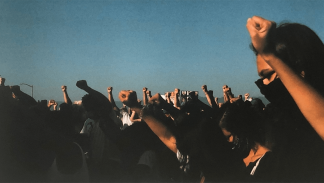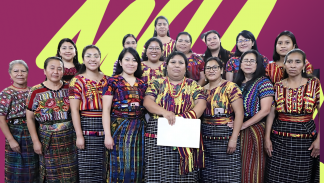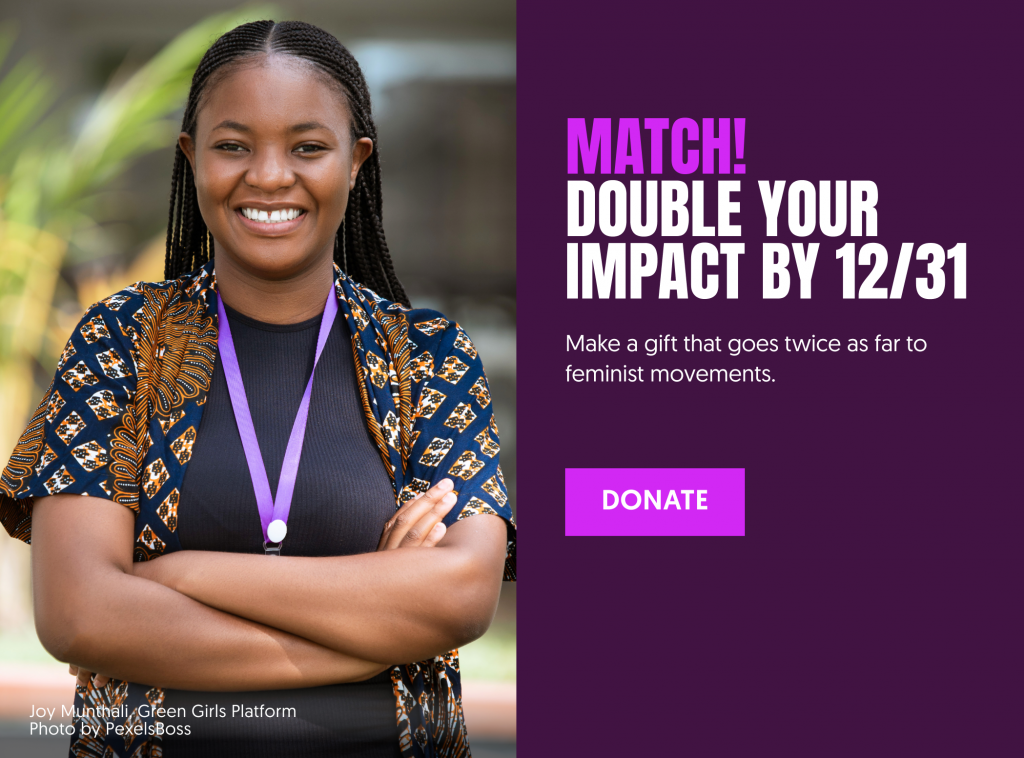Indian Artivist Jasmeen Patheja on the Magic of Mentorship
Artist, performer, and mentor Jasmeen Patheja has a few things to say about the power of creativity and shared learning to create change. Jasmeen is the founder-director of Blank Noise, a community of individuals called ‘Action Heroes’ across India and beyond, united to eradicate gender-based violence. Through art installations and performances, Blank Noise explores the intersection of abuse, violence, and blame in public and private spaces through art. She is a TED and Ashoka Fellow, and was recently awarded an Awesome Without Borders grant from the Harnisch Foundation. In 2017, Jasmeen delivered a TED Talk on safety and ending street harassment and sexual violence in public spaces at TED Talks India, which was received with a standing ovation.
As a mentor to 10 young women leaders in India as part of our Young Women’s Leadership Initiative, Jasmeen has played a vital role in helping to empower the next generation of leaders. We spoke with Jasmeen over Skype from her home in Bangalore about what the program has meant to her, why she values being a mentor, what she has learned, and how she infuses art into social change movements.
Global Fund for Women: We’d love to start with having you share more about yourself and Blank Noise with our audience.
Jasmeen Patheja: I grew up in Kolkata, India and I’ve been in Bangalore for 20 years now, so almost half my life. When I came here to attend art school, it was my first time away from home. Experiencing street harassment and not really having home to run back to made me feel more vulnerable than I had felt before. I noticed that there was a missing conversation around street harassment at the time, in the late 1990s/early 2000s. I wanted to address it.
As an art student, I was interested in questions around the role of art and the place of art in society, in activism, in change—questions like: Who builds art? How does art heal? How does art confront? How is art protest? I was exploring these and other questions, and found a real sense of home in community and public art practice, and in exploring how feminist artists were practicing art.
Blank Noise emerged from these experiences of being 23, on the streets of Bangalore, and exploring key questions around art, social change, violence, and community.
So what sort of change have you noticed in the 16 years since you started Blank Noise?
The issue of street harassment and gender-based violence in the public sphere is no longer being dismissed, it’s no longer being swept under the carpet. We are collectively disturbed. We are allowing ourselves to be uncomfortable and have these conversations, versus pretending like it doesn’t exist. That’s been the biggest shift.
How did you become interested in women’s rights?
It was really through the same process. Through art, through realizing that there was a vocabulary and a herstory to what I was experiencing and what I was noticing. My art practice became an entry point for me to feel connected to what had happened already and the larger feminist movement.
Why are you interested in young women’s leadership and empowering young women mentors?
There are systems in place that disallow our leadership as women. Building leadership is a process of building personal capacity, of building tools to negotiate, of keeping our ears to the ground, and of speaking with and for women and communities we work with. To change the tide, we need young women leaders. We need young women feminist decision-makers, policy makers, storytellers. We know that change or progress is not necessarily linear. I’m excited about being part of somebody’s journey and having somebody’s back—having received some of that myself, it’s a way of passing it along to the next generation, and being part of their process, too.
What are you seeing the young women leaders in this initiative bring to the table?
There are 10 young women leaders in India and each of them is working on a unique project toward movement-building and community-building, and they’re also stepping into the role of being mentors to another 10 young women leaders from the communities that they work with and in. So it really feels like we’re creating a pattern of leadership and building personal and community capacity.
What’s different about their ideas or the ways they’re approaching women’s rights and mentorship?
I’m seeing something both internal and external. There’s a sense of creating space for feelings, of checking in with themselves and with each other, of having self-reflective conversations alongside conversations about rights. There’s a sense of creating safety amongst the group. These young women are going on a not-so-prescribed path and they’re being courageous to do that—and taking deliberate steps.
Most importantly, what I’m seeing increasingly amongst the 10 young women leaders in India is a sense of community and connectedness and safety among them. They’re really exchanging notes and ideas and learnings. Somebody’s in northeast India, somebody’s in rural Gujrat—so they’re really spread out and they come from very diverse backgrounds and perhaps had their own biases or their own preconceived notions at the start of the journey. But they are really a team now.
You’ve spoken a few times about this notion of creating, and that ties back to your identity as an artist. How are you bringing art and creativity into your mentorship process and the Young Women Leaders initiative?
The art practice—everything that we’re doing at Blank Noise—is about coming from the personal to the social to the political. And we’re working with the young women leaders toward having that point of intention as well—thinking about why this is important for them and having them articulate that. We introduced journaling at the Training of the Trainers program, and it’s now being used as a tool that the young women leaders practice and something they share with the community of young women that they work with.
In another session, we asked all the leaders to bring the community of other young women that they are working with into the room without them actually being physically there. It was an exercise in how they would bring other women’s voices and perspectives, and what medium they would work with. So we’re pushing them to think differently about mediums and finding different, new ways of storytelling. So there’s a sense of walking in new, unknown spaces. And many of the young women leaders said, you know, I’m not an artist and I can’t draw. So I’ve been pushing them to really think about art differently, and we’re questioning how we choose to tell stories and how we make meaning.
What excites you most about being a part of this initiative?
There are so many things that I’m excited by. The sense of being on this journey together. That there’s something that young women leaders are experiencing that they’re bringing and we’re also learning through them—we’re learning together and among each other. It has been a space of recognizing and being self-reflective with some questions around power and patriarchy and feminism, as well as questions around young women’s leadership: What does it mean to be a young woman leader? How do you put your ear to the ground? How do you practice listening versus just being a solo decision-maker?
There’s a sense of solidarity and learning together and shaping as we go along. It’s new all around—I’m excited to be a part of a program that’s setting a longer agenda. Because there is a real need for a young women’s leadership program and pipeline. This intergenerational, transnational mentoring process is extremely valuable.
What do you believe are the values or benefits of intergenerational leadership?
For me, intergenerational leadership is very enmeshed in what it means to be South Asian. That has been really powerful—that there’s a sense of coming together. At the start of the program, we had orientation programs where we spoke about age and power, and we addressed power and what to watch out for, in a sense. There’s been such a connection among the mentors and the young women leaders that all of that seems to have—for me, at least—dissolved. There’s no hierarchy. I’ve experienced generosity and a sense of personhood despite age and language and regional differences. There have been connections and friendships. There’s been a certain intimacy in a professional sense—of being able to share and speak and work together.
What are your hopes for the future for young women and girls in India?
I want young women and girls to be able to say yes and to say no. To build our capacity to be able to own our “yes’s” and own our “no’s”. I want girls and women to be able to do that across spaces and to really own our right to use our voices.
There’s a sense of solidarity and learning together and shaping as we go along. It’s new all around—I’m excited to be a part of a program that’s setting a longer agenda. Because there is a real need for a young women’s leadership program and pipeline. This intergenerational, transnational mentoring process is extremely valuable."Jasmeen Patheja



